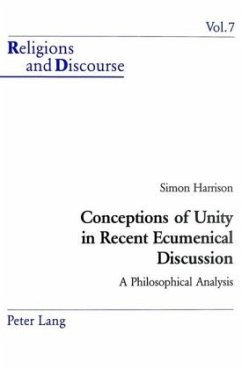This is the first book-length analysis of the term unity as used within recent ecumenical discussion. It seeks to present in a clear and useful way the many conceptions of unity found in discussion, whose subtle diversity and number are often a source of confusion and ambiguity. It is intended primarily for ecumenical participants and students; but the methodology is of wider interest because it employs taxonomy (of a kind usually found within biological sciences) to analyse and present conceptual diversity.
"In this unique contribution to ecumenical theology, Dr Harrison mounts a sustained challenge to current methods of ecumenical dialogue. His thorough and comprehensive analysis of the diverse uses of the term 'unity' reveals incoherence and ambiguity at the heart of the quest for Christian unity. If Harrison's challenge is to be met, ecumenical theology will need to become much more rigorous and methodologically reflective."
(Paul Avis, General Secretary: Council for Christian Unity)
"People who write about Christian unity usually do so from a theological, historical or sociological background. This book looks at Christian unity from a philosophical standpoint, and provides refreshing and new insights."
(Martin Reardon)
"Simon Harrison seeks to bring different disciplines together in order to illuminate conceptions of unity in recent ecumenical discussions. He reviews an impressive number of ecumenical documents, using Wittgenstein's analytical philosophy and biological taxonomy in an original way. What he says about the notion of koinonia (communion), a central theme in all recent writing on the doctrine of the Church, will be particularly valuable. This book deserves to be read widely. It should help towards coherence and consistency in the ecumenical debate and in moves towards unity which depend upon those debates." (Mary Tanner).
(Paul Avis, General Secretary: Council for Christian Unity)
"People who write about Christian unity usually do so from a theological, historical or sociological background. This book looks at Christian unity from a philosophical standpoint, and provides refreshing and new insights."
(Martin Reardon)
"Simon Harrison seeks to bring different disciplines together in order to illuminate conceptions of unity in recent ecumenical discussions. He reviews an impressive number of ecumenical documents, using Wittgenstein's analytical philosophy and biological taxonomy in an original way. What he says about the notion of koinonia (communion), a central theme in all recent writing on the doctrine of the Church, will be particularly valuable. This book deserves to be read widely. It should help towards coherence and consistency in the ecumenical debate and in moves towards unity which depend upon those debates." (Mary Tanner).

